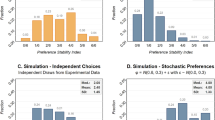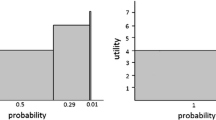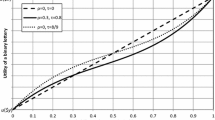Abstract
A descriptive model of risk taking is presented according to which the utility of a choice of a risk-filled course of action is a function of the utility values and the probabilities of the outcomes of this choice and of an individual parameter indicating an inclination to take risks of a certain magnitude. According to this model, favorable and unfavorable outcomes are weighed differently in decisions. The moments of the probability distribution over the utility values of outcomes are not explicitly considered. The model has been tested by asking 71 university-level students to design risk-filled action alternatives assumed to be equal in utility to alternatives having only one outcome. Outcomes were fictitious and monetary. The risk-taking model gives a better explanation of the utility of alternatives than a model according to which expected utility is maximized, but the improvement is rather small. According to the model, the subjects were on the average somewhat more cautious than would be implied by the maximization of expected utility. However, it proved problematic to identify simultaneously the inclination to take risks and the utility values of outcomes. As expected, the utility function obtained when risk taking was assumed to exist was concave but less so than when no risk taking was assumed to exist. The possibilities of using the model in further research are discussed.
Similar content being viewed by others
References
Allais, M. (1979a), ‘The foundation of a positive theory of choice involving risk and a criticism of the postulates and axioms of the American School’, pp. 27–148 in Expected Utility Hypotheses and the Allais Paradox (eds. M. Allais and O. Hagen), D. Reidel, Dordrecht, Holland.
Allais, M. (1979b), ‘The so-called Allais Paradox and rational decisions under uncertainty’, pp. 437–682 in Expected Utility Hypotheses and the Allais Paradox (eds. M. Allais and O. Hagen), D. Reidel, Dordrecht, Holland.
Allais, M. (1984), ‘The foundations of the theory of utility and risk. Some central points of the discussions at the Oslo Conference’, pp. 3–131 in Progress in Utility and Risk Theory (eds. O. Hagen and F. Wenstøp), D. Reidel, Dordrecht, Holland.
Cohen, M., Jaffray, J. Y. and Said, T. (1985), ‘Individual behavior under risk and under uncertainty: an experimental study’, Theory and Decision 18, 203–228.
Edwards, W. (1955), ‘The prediction of decisions among bets’, Journal of Experimental Psychology 50, 201–214.
Hagen, O. (1979), ‘Toward a positive theory of preferences under risk’, pp. 271–302 in Expected Utility Hypotheses and the Allais Paradox (eds. M. Allais and O. Hagen), D. Reidel, Dordrecht, Holland.
Kahneman, D. and Tversky, A. (1979), ‘Prospect theory: An analysis of decision under risk’, Econometrica 47, 263–292.
McCord, M. and de Neufville, R. (1983), ‘Empirical demonstration that expected utility decision analysis is not operational’, pp. 181–199 in Foundations of Utility and Risk Theory with Applications (eds. B. P. Stigum and F. Wenstøp), D. Reidel, Dordrecht, Holland.
MacCrimmon, K. R. and Larsson, S. (1979), ‘Utility theory: axioms versus ‘paradoxes’,’ pp. 333–409 in Expected Utility Hypotheses and the Allais Paradox (eds. M. Allais and O. Hagen), D. Reidel, Dordrecht, Holland.
Múnera, H. A. and de Neufville, R. (1983), ‘A decision analysis model when the substitution principle is not acceptable’, pp. 247–262 in Foundations of Utility and Risk Theory with Applications (eds. B. P. Stigum and F. Wenstøp), D. Reidel, Dordrecht, Holland.
von Neumann, J. and Morgenstern, O. (1964), Theory of Games and Economic Behavior (3rd ed.), Wiley, New York.
Author information
Authors and Affiliations
Rights and permissions
About this article
Cite this article
Dahlbäck, O. An experimental analysis of risk taking. Theor Decis 29, 183–202 (1990). https://doi.org/10.1007/BF00126801
Issue Date:
DOI: https://doi.org/10.1007/BF00126801




